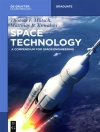The executive summary provides a short overview of the European space economy and its funding landscape and summarises the findings and recommendations of the study.
The study reviews access-to-finance conditions met by companies active in the European space sector and proposes potential solutions to improve them. One of the principal objectives of this study is to analyse how public funds in the EU could be deployed to attract private investment and otherwise catalyse the development of the sector, considering also that such public funding should be entitled to achieve adequate returns. The study further explores how soft measures and advisory services could help promote private investment in the sector.
Space is an important driver of innovation in Europe. While space used to be synonymous with government spending, today the sector sees the emergence of new private actors who see commercial opportunities in space exploration and exploitation. The study presents a number of recommendations and potential policy actions. One particular recommendation is to establish a Space Finance Forum: by bringing together the expertise of financial, industrial and academic stakeholders, we believe we will be able to explore and pilot new funding mechanisms and thereby catalyse private investment in the sector.
The study was carried out by Innov Fin Advisory in collaboration with the European Investment Advisory Hub, with the support of Space Tec Partners.
Über den Autor
About European Investment Bank
The European Investment Bank is the world's biggest multilateral lender. The only bank owned by and representing the interests of the EU countries, the EIB finances Europe's economic growth. Over six decades the Bank has backed start-ups like Skype and massive schemes like the Øresund Bridge linking Sweden and Denmark. Headquartered in Luxembourg, the EIB Group includes the European Investment Fund, a specialist financer of small and medium-sized enterprises.












